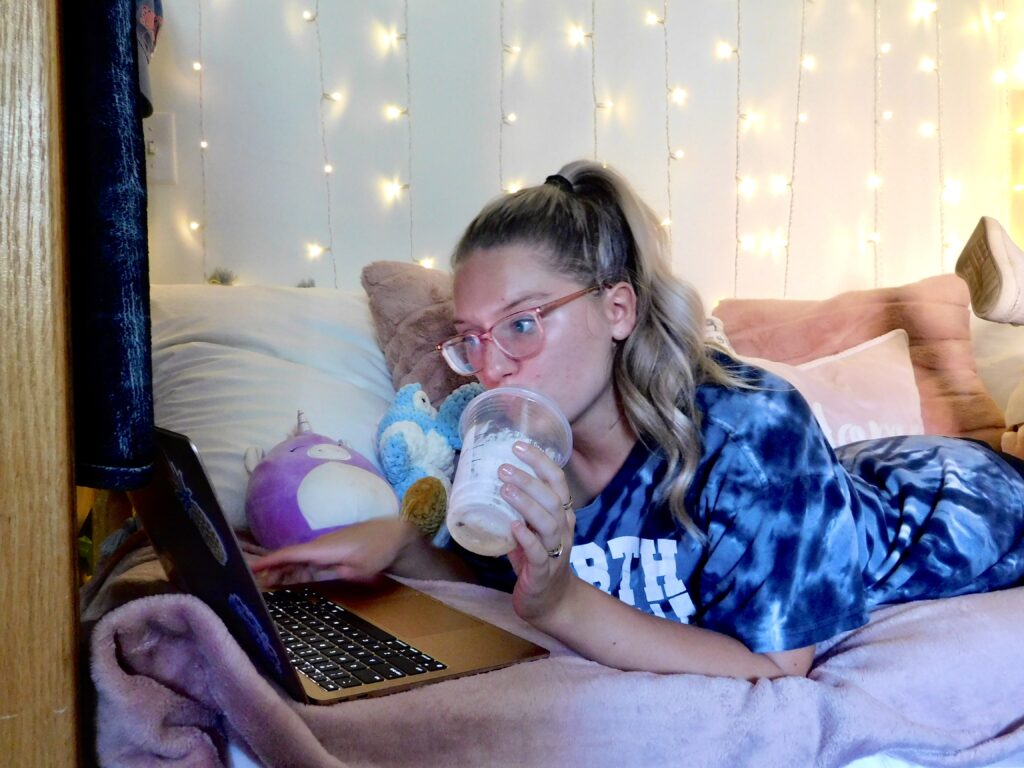
Top 10 ways to better your mental health during finals week
Sadie Beaumont, Staff Writer
Tests, projects and papers, oh my. Finals week is one of the most dreaded times in any college student’s career and unfortunately, it’s just around the corner. But never fear–there are several ways to help make the week quick and painless.
#1: Go to sleep. Senior psychology major Elijah Scott shares that staying up all night “binge studying” will likely not work.
“Either wake up and study or just be smart and study over a period of about a week. Study right before bed the most important stuff. You’ll remember it the best,” he said.
#2: Don’t forget to eat food and drink water. It sounds self-explanatory, but for many students, it’s a habit that they either forget or procrastinate.
“If you don’t feed your body, it’s not going to work for you, and that includes your brain,” Scott said.
#3: Exercise. Even if you don’t feel like it, you’ll feel so much better and rejuvenated after you do. Even just a 20-minute walk outside can help clear your mind and energize your body.
#4: Put down your phone. Sophomore psychology and English major Liam Riley said that it is a big help when he doesn’t look at his phone at all, unless he is using it for music or entertainment while studying.
“I find that personally I get stressed when I’m just looking at my phone, and I have so much stuff that I need to do, but I get distracted by something else and it makes me feel gross,” he said.
#5: Practice gratitude with a gratitude journal. This will put you in a much more positive headspace and allow you to think outside of the “finals slump.”
“If all you can talk about is how miserable your finals are, you’re going to be miserable. If you’re willing to look at the good in your day, it will make the day more bearable, and more than likely you’re going to walk away feeling better about the day,” Scott said.
He added that gratitude journaling does not have to be a long process. Simply writing out five things you’re thankful for before bed or when you wake up can make all the difference.
#6: Set goals. Scott said that it’s important to break up your studying for each class into little chunks and know exactly what you want to study instead of just cramming it all into one night. Know what you want to cover and be smart with your time.
#7: Make sure to take time for yourself. Go talk to your friends and family. Go out and grab your favorite snack. Go have some fun.
“School is important, and it’s going to put you in important places, but you’re not going to process what you need to process if your headspace is not where it needs to be,” Scott said.
#8: Identify exactly where your stress is stemming from. Anchor Therapy, a counseling center in New Jersey, included this in their tips for unwinding during finals.
“The source of one person’s stress may be the fact that their entire grade for the semester is based on one final exam. For another individual, it may be that this grade will determine whether or not they get into a graduate school of their choice. Once you understand the problem, you are prepared to construct an action plan to remove or lessen the severity of your stress,” said Anchor Therapy.
#9: Find what studying method works best for you. Some students work best in a group, while others thrive alone in their own room. Discover your groove, and once you’ve found what works, stick with it.
#10: Find support from a counselor if needed. If you feel like none of the above tips have worked for you and you need a trusted person to talk to, go visit the school’s counselors.
“Trying to find a balance between studies, activities and social life can also be difficult. In order to assist students in facing some of these challenges, North Greenville University provides confidential, personal counseling at no cost to students, faculty and staff,” NGU’s counseling page said.
NGU has two counselors: Steve Bielby and Sara Black. You can easily book an appointment with either of them on the university’s website and hopefully relieve some stress.
